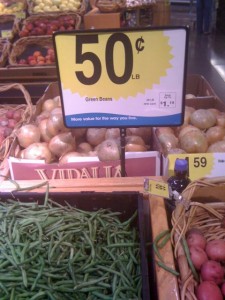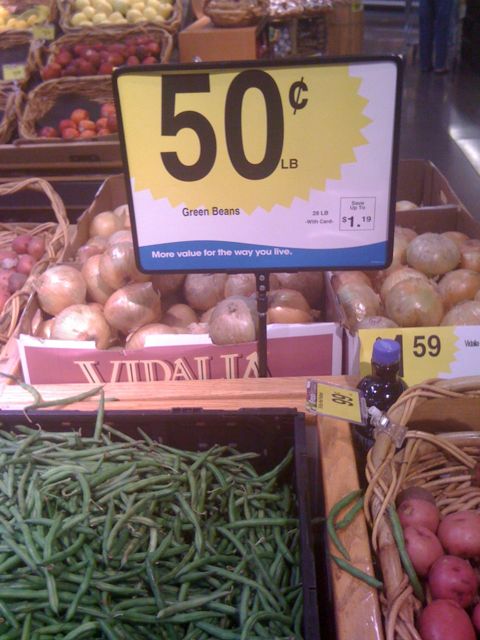There’s nothing worse than knowing that once that winter frost hits, tomatoes are going to go through the roof. I mean, I love the bright sun, the warm days and the late nights that come with the summertime, but I’ma keep it real. The best thing that summer can do for me is bring the price of tomatoes down to $1.29 per pound.
I get so used to enjoying a tomato every day, that I tend to shed a tear when the price goes up. Just one.
Let’s look at produce practically. In short, someone has to grow it.
Certain fruits and vegetables can only be grown in certain climates… that’s why certain locations are “known” for certain types of produce – Florida Oranges, Georgia Peaches… some places just do what they do relatively well. You won’t find Minnesota bragging about their winter strawberries.
Let’s say that you live in… some place that gets snow. Snowville, USA. Provided you don’t have some awesome locavore or CSA network that you’re affiliated with (more on those later), you’re probably getting your produce from a grocery. That grocery knows that its patrons complain when they can’t have their beloved strawberries in the winter, so what does the grocery store do? They call up their folks in Florida, and ask them to ship some strawberries up north!
Florida then puts on its cape and tights, and says “I’m on my way!” Before you know it, a giant truck is on it’s way from Florida to Snowville to make sure that this grocery store has its strawberries for their patrons to enjoy. Remember, we’re Capitalists – the grocery store doesn’t want you to go elsewhere to get your strawberries, because they know that out of convenience, you’ll just keep shopping at your strawberry place for everything else.
When you pay for strawberries out of season, you’re paying for labor – it takes effort to get strawberries from Florida to Snowville – as well as the fuel used to drive them to you. Yes, you’re paying for the gas. That cost has to be passed on to someone, and why not the customer who insists on having strawberries out of season?
Remember the great gas hike of 2008? Remember how the news kept saying that it affected food prices, but no one understood why? We were paying for the extra cost of the food being shipped to the store. The grocery store for darn sure wasn’t going to pay for that. Interestingly enough, those people who were buying their produce locally and in-season were relatively unaffected by the hike. They weren’t paying for produce shipped a thousand miles away from where it was grown… or the gas bill that comes with it.
Buying in season means that the spring time brings you lots of lemons, spinach, turnips, strawberries, kale, lettuce, celery, peppers, peas and onions. The summer gives us artichokes, broccoli, cherries, peaches, sweet corn, cucumbers, honeydew melons, raspberries, tomatoes and watermelon. We can look forward to the fall for pears, plums, pumpkins, garlic, carrots, apples, squash and zucchini. The winter might not offer too much, but as for new veggies? I’ve grown to appreciate my collard greens, brussel sprouts, radishes and cabbage.
Buying your produce while it’s in season means that you’re most likely to purchase the product when it’s plentiful in your area.. which means sales! I mean, let’s keep it real – nothing made me happier today than to see this beautiful sight below:

To help you on your journey toward in-season shopping, I’ve pasted a relatively exhaustive list of what you should be able to find during each month of the year for cheaper. Good luck, and gimme a dollar! You should have plenty left over. 🙂
Spring
Apricots
Artichokes
Asparagus
Belgian Endive
Broccoli
Butter Lettuce
Chayote Squash
Cherimoya
Chives
Collard Greens
Corn
English Peas
Fava Beans
Fennel
Fiddlehead Ferns
Green Beans
Honeydew
Mango
Morel Mushrooms
Mustard Greens
Oranges
Limes
Lychee
Pea Pods
Pineapple
Ramps
Rhubarb
Snow Peas
Sorrel
Spinach
Spring Baby Lettuce
Strawberries
Sugar Snap Peas
Swiss Chard
Vidalia Onions
Watercress
Summer
Apricots
Beets
Bell Peppers
Blackberries
Blueberries
Boysenberries
Butter Lettuce
Cantaloupe
Casaba Melon
Chayote Squash
Cherries
Cherries, Sour
Corn
Crenshaw Melon
Cucumbers
Eggplant
Figs
Garlic
Grapefruit
Grapes
Green Beans
Honeydew Melons
Jalapeno Peppers
Lima Beans
Limes
Loganberries
Lychee
Nectarines
Olallieberries
Okra
Passion Fruit
Peaches
Peas
Persian Melons
Plums
Radishes
Raspberries
Strawberries
Summer Squash
Tomatillo
Tomatoes
Watermelon
Zucchini
Fall
Acorn Squash
Belgian Endive
Broccoli
Brussels Sprouts
Butter Lettuce
Butternut Squash
Cape Gooseberries
Cauliflower
Celery Root
Chayote Squash
Cranberries
Diakon Radish
Garlic
Ginger
Grapes
Guava
Huckleberries
Jalapeno Peppers
Kohlrabi
Kumquats
Mushrooms
Passion Fruit
Pear
Persimmons
Pineapple
Pomegranate
Pumpkin
Quince
Sweet Potatoes
Swiss Chard
Turnips
Winter Squash
Winter
Belgian Endive
Brussels Sprouts
Cherimoya
Chestnuts
Collard Greens
Dates
Grapefruit
Kale
Kiwifruit
Leeks
Oranges
Passion Fruit
Pear
Persimmons
Pummelo
Radicchio
Red Currants
Sweet Potatoes
Tangerines
Turnips
Winter Squash
[source]
Other posts in the series:
- Save Money On Groceries: Buy It In Bulk
- Save Money On Groceries: Buy It In Season
- Save Money On Groceries: Go Weekly
- Save Money On Groceries: Buy The Private Label (Go Generic!)
- Save Money On Groceries: Go Frozen!
- Q&A Wednesday: The $50 Challenge
- Save Money on Groceries: Go… Smaller?
- Save Money On Groceries: The Readers Share Their Tips!




15 comments
i feel the same way ive started the clean eating and im getting used to it i found a vegetable vendor that sells bell peppers 2lb for a dollar i bought 6 lbs me and the freezer are good friends. but i cried when i saw cherries 5.00 a lb
See? Why are you buying cherries in the springtime? Wait! Get something else instead! LOL!
Erika,
Your blog is now my favorite blog!
You must publish a cookbook! You can name it “The Black Girl’s Guide to Cooking – everything you wanted to know, but were afraid to ask”. I’d definitely purchase it! LOL
Sure I see the seasonal veggies on sale for wonderful prices, but can you believe, and I’m ashamed to say, that I have no idea how to cook them?!
I did borrow the “How to Cook everything – Vegetarian” and “How to Cook Basics” cookbooks from the library and I’m hoping I can learn something from them. I tried steamed artichoke last night for the first time and it was delicious! I will be steaming another one tonight.
Do some digging! I didn’t always know how to bread my green beans, but please believe I’m glad I did!
I went through my fair share of grits-burning sessions before I figured out just how I like ’em. No matter what recipe we pick up, we’ll always need to modify it for ourselves… but at least we can appreciate the recipe for giving us an idea. You’ll just have to do some buying, and that’ll force you to do some digging. I’ve got a bag of radishes in my fridge – they were a dollar – that I’m dying to use in a salad, now that I know what to use ’em in! 🙂
i freakin LOVE you for this post!! i’m always in the produce section trying to save my pennies, at least i have more of an idea now! i should print your list out lol
This is a great list…it gave me some ideas for new vegetables to try when they are in season
Thank you for all the great advice… I’m digging through it now..love what youre doing.
I must have my favorite fruit year round, but I refuse to buy out of season, so I stick with frozen during the fall and winter. It is picked and frozen while it’s in season. It goes straight from the farm and then through the IQF (individually quick frozen) process, which is a process that keeps frozen foods from sticking together. The fruit they freeze is actually picked when it’s ripe instead of before it’s ripe and we all know that fruits and veggies that are ripened when attached to the plant taste far better than those that aren’t. Since I’ve moved from a place that yields most fruits and veggies year round to one that doesn’t, I’ve switched to frozen for most things during the winter. It took a bit of trial and error, but I’ve found Dole and Whole Foods store brand to be the best across the board. Trader Joe’s is my personal favorite for berries of all types.
This was very informative
This is a great post and very helpful. Thanks for posting! 🙂
Buy in season food is not just a good idea because it’s cheaper, it’s a good idea because it gives you what you need to survive the season your in. It’s not a coincidence that winter food is denser or summer produce has a lot of water in it. It’s what your body needs in that season.
I found your site through your front page feature on AOL today this morning while checking emails. Long story short, I can not stop reading your information. Thank you so much for sharing your story and knowledge here.
Another tip: Grow some stuff in a plot or pots. You don’t have to do it all but just a few things will help the budget. We have a herb garden and it pretty much takes care of it self. That alone will save you tons of money and make your dishes herbalicioius.
If you don’t have room to grow stuff, offer to pay for the seeds and supplies for a friend who does. They can tend it, you can water it when they go on vacation. Everyone wins.
Like and sharing!
I’m neither black, nor a girl, nor particularly interested in losing weight. (I did lose 80 pounds, but I’m done losing.) However, I do have to live off an EBT card for all my groceries, and I try to eat quality food. I also avoid GMOs and products with palm oil, more for environmental reasons than health reasons. I am quite impressed with your website, and appreciate this list of in-season produce. I’m hoping to find a good Facebook group for eating well while paying very little (Current living situation does not allow me to grow vegetables, and I have limited use of a stove, unfortunately), but so far, nothing particularly useful found on Facebook.
Comments are closed.